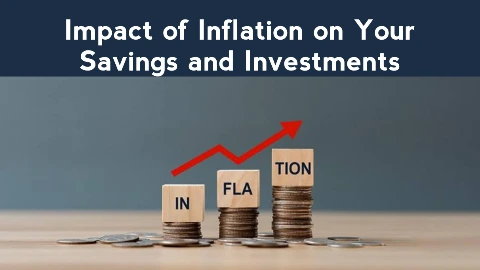Have you ever wondered why the money in your savings account does not seem to go as far as it did a few years ago? Imagine this: You saved a good amount of money thinking it would be enough to buy a car or maybe a house in the future. But when the time comes, the prices have gone up, and your savings feel smaller than before. That is inflation in action.
Inflation is when the prices of goods and services go up over time. It happens slowly, but its impact is huge on your savings and investments.
How Inflation Affects Your Savings
Think about this: You put your money in a savings account with a 4 percent interest rate per year. Sounds good, right? But if inflation is at 6 percent, you are actually losing money every year. Your purchasing power is going down even though the numbers in your account are increasing.
Many people believe saving money in a bank is the safest option. And yes, it is safe in the sense that it will not disappear overnight. But inflation quietly eats away at its value. Your savings might look like they are growing, but in reality, they are shrinking when compared to rising prices.
A lot of people have felt this firsthand. My grandfather used to tell me how he could buy a full meal for just a few rupees decades ago. Now that same meal costs hundreds. This is the simple truth of inflation—money loses its value over time.
Inflation and Investments
Now let us talk about investments. They are different from savings because instead of keeping money still, you are letting it grow. Investments are a great way to beat inflation, but not all investments work the same way.
Some people invest in fixed deposits thinking they are making a smart move. But fixed deposits often offer returns lower than inflation. So again, even though your money grows, it may not keep up with rising costs.
Stocks and real estate, on the other hand, have historically performed well against inflation. They grow in value over time and provide returns that often exceed inflation. But they come with risks—stocks can go up and down quickly, and real estate requires a big investment upfront.
Gold is another popular choice. It has been a store of value for centuries. Many people buy gold during inflation because its price often rises when money loses value. It is not perfect, but it is a trusted option for long-term protection.
How to Protect Your Money from Inflation
So, what can you do to make sure inflation does not hurt your savings and investments?
First, do not keep too much cash in savings accounts. Keep enough for emergencies but invest the rest where it can grow.
Second, diversify your investments. Do not put all your money in one place. Spread it across stocks, real estate, gold, and even government bonds. A good mix reduces risk and helps your money grow steadily.
Third, stay informed. Inflation rates change over time. Some years inflation is low, and some years it is high. Keep track of it so you can adjust your investments when needed.
Finally, invest in assets that grow with inflation. Real estate rental income, stocks in strong companies, and certain types of mutual funds can help protect your wealth over time.
Final Thoughts
Inflation is a silent thief. It slowly reduces the value of your hard-earned money. But with smart planning, you can stay ahead. Saving is important, but investing wisely is even more crucial. The key is to make sure your money grows faster than inflation so you do not lose purchasing power over time.
So next time you think about where to put your money, ask yourself: Will this help me beat inflation? If not, it might be time to look for better options.



